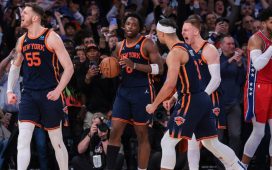A friend who knows him once told me that there are two Jay Monahans. “There’s Golf Jay and Hockey Jay,” he said of the mulish Boston native, “and you don’t want to meet Hockey Jay.”
It sounds as though it was Hockey Jay who addressed a meeting of PGA Tour players this week in Charlotte, at which the commissioner laid out in unambiguous terms the sanctions awaiting anyone who joins either of the splinter circuits promising gaudy sums in a bid to upend professional golf’s established order.
Multiple sources had Monahan reiterating his long-standing position: It means an immediate suspension from the PGA Tour and likely a lifetime ban. For the handful of players who thought their ship had come in with offers reported at $30 million, it must have been sobering to realize Monahan is bent on ensuring that ship – the seaworthiness of which is decidedly unproven – will have no life raft.
Whether it’s the Premier Golf League (PGL) or Super Golf League (SGL) – the former formerly financed by the Saudi regime’s blood money, the latter latterly flush from the same source – both face an identical stumbling block: persuading the PGA Tour’s best to jump. Since no one seems eager to be first over the rampart, that really means enticing a quorum to jump together. And that’s a tough sell when there’s anecdotal evidence that Monahan isn’t bluffing.
At the 2020 Genesis Invitational, there were rumors around Riviera that a prominent star might announce his support for the Premier Golf League concept. There was a contiguous debate at Tour HQ about the response should the player do so. Only two options were tabled: boot him immediately or wait until the tournament had concluded out of respect for the sponsor, much as Michael Corleone delayed whacking his brother-in-law Carlo until his kid was baptized.
While it’s clear the Tour is taking seriously the existential threat posed by these rival groups, it remains to be seen how it shores up the two principal vulnerabilities these concepts have exposed with the precision of, well, a bone saw. One involves fan perception (they don’t see the best golfers face each other often enough) while the other is a grievance among elite players (they deserve a lot more money).
Both quandaries share an underlying issue: too many rank and file dregs cluttering up the PGA Tour product. That’s a thorny dilemma in a member-based organization, but there is a pathway to placating both constituencies. More than two decades after their creation, the oft-maligned World Golf Championships can finally serve a purpose.
Leaving aside the WGC-Dell Technologies Match Play, which features the top 64 ranked players who can be bothered trekking to Texas, the remaining three WGCs usually have between 72 and 78 competitors in the field. All of them – the WGC-Workday Championship, the WGC-FedEx St. Jude Invitational and the WGC-HSBC Champions – invite the top 50 in the world golf ranking then often fill empty lockers with the lower orders of other global tours. That produces more journeymen than would be countenanced in a PGL/SGL tournament.
These WGCs can be reimagined to address the twin issues exploited by the Premier and Super league conceits. By engineering elitism – if you’re not in the top 50, don’t expect an invitation – the Tour can not only showcase top players competing against each other more frequently, but use WGCs as a vehicle to bestow yet more riches upon them. It’s guaranteed money by another name, divvied up among the Goliaths while the Davids make rent at an opposite-field event.
The Tour could compel stars to play a minimum three WGCs each year or risk forfeiting ranking points earned at all of them, thus jeopardizing their top-50 status. The recently revealed Player Impact Program partially tackles the money grousing by bonusing players who move the needle with fans, but that only benefits a few. Weaponizing the WGCs against the PGL and SGL benefits all the Tour’s top players and viewers too.
There would almost certainly be objections from the incipient socialist resistance of Tour players who would not benefit from this and who have taken to insisting that money be spent for the greater good, which they define as themselves. It’s a tenuous argument. In the 2018-2019 Tour season – the last not impacted by Covid – a total of 120 players earned more than $1 million in prize money and FedEx Cup bonuses. The guy who finished 150th on the money list, on the strength of a solitary top-10, earned more than $660,000.
Those are handsome hauls for mediocrity. A reckoning on the relative worth of Tour players isn’t necessarily limited to the top of the food chain.
Hockey Jay has notified the Tour’s star players of the consequences if they split. Next up: spelling out for the rest of his membership what they must live with to prevent that happening.








